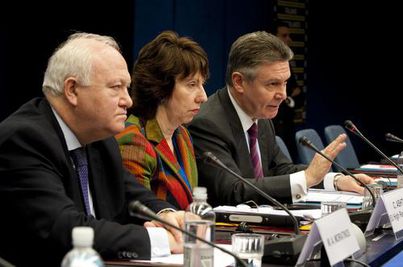Was Catherine Ashton right not to be in Haiti?

(BRUSSELS2) Several parliamentarians and commentators have echoed the absence of Catherine Ashton, the High Representative for Foreign Affairs of the European Union, who was not in Haiti just after the earthquake. I do not share their opinion. No offense to some, I think she was right. Going there had some pros but also cons.
Admittedly, it's a political “momentum”: being there at the same time as Hillary Clinton or Ban Ki Moon could be important for the future. It is also a gesture of solidarity: towards the Haitians. It is a media moment: where the presence of Europe must be symbolized, personified.
But there are also equally serious drawbacks, operational, political and media. It's not really a problem of seats on the plane in itself, which raises questions (there are always a few seats available) but it freezes the airspace for a while, as well as traffic at the airport. The security generated by the arrival of a high personality hampers the rescue. It is a fact. Clinton's arrival thus froze traffic at the airport for some time. It is also giving in to show politics. We come, we shake three hands, we take a child in our arms in front of the cameras and we leave. If Ashton had done that, I think she would have been criticized as much, if not more... On the political level, the discussion in New York at the UN and in Washington with Clinton was more profitable. From a media point of view, I'm not taking the picture for you : between Hillary Clinton, Ban Ki Moon and a European representative who do you think the media would have chosen to illustrate their report? ![]() (*)
(*)
Catherine Ashton was therefore right not to go to Haiti
Its place was more in Brussels (see NB) to organize and coordinate action at the political level. What she did by convening (a little late) an extraordinary Council of Ministers. What is unfortunate is that she did not then delegate the function of representing Europe, to a minister already there - the Spanish Deputy Prime Minister for example - to a European commissioner - after all, that was more the role of the Commissioner for Humanitarian Aid, in this case De Gucht - or that it did not propose the appointment, quickly, of a special envoy (**), able not only to coordinate European aid but to have a certain political rank. This last solution has my preference - even if excellent experts of the file assure me that it had a disadvantage of complicating the deal. I do not believe that.
NB: If, on the other hand, she was neither in Haiti nor in Brussels, but in London (Friday and Saturday), to go shopping, as my colleague Jean Quatremer related on his blog, but especially for a series of briefings, in particular, with certain officials of the Foreign Office, as had already been the case before his hearing by the European Parliament, it would be more difficult to justify. And I dare not believe it. The function of High Representative must be independent.
(*) As for the other reasons given by certain diplomats, invoking the fact that the post of High Representative has just taken office, that the external service does not exist, that the Commission is in transition, etc., they certainly justify a bit of a "mess", but they are not really acceptable given the intensity of the disaster. Whatever the institutional changes underway, there is, on both sides, an administration (to the European Commission and the Council) which should be experienced in crisis management. Moreover, the function of the High Representative in itself is not new, it has existed for 10 years. That of European Commissioner for External Relations. It is the merger of the two functions (European Commissioner and High Representative) that is new. And even more! It has been planned for 6 years. It is surprising that no one has reflected, at the strategic, non-administrative level, on the needs that carried away this merger...
(**) Decision which arises from the sole initiative of the High Representative and requires approval - by qualified majority only and not unanimously - by the Ministers. This kind of procedure can be settled either in writing, or by an extraordinary council: there was one, last Monday, of the Ministers of Development: they had the capacity to decide on it.


I'm quite shocked that you can agree with Lady Ashton, shopping or not!
Allow me to refer you to Sylvie Goulard's column: “Madame Ashton, do you have a heart?” on his website: http://sylvie-goulard.eu/index.php/content/40-accueilcontent/247-25janv2010 .
When the European Union finally has a voice responsible for foreign affairs, we would like a little humanity!